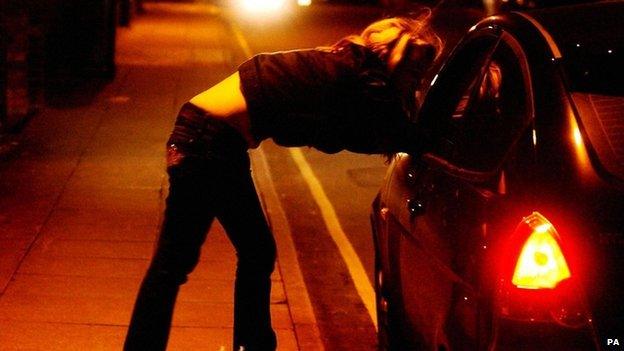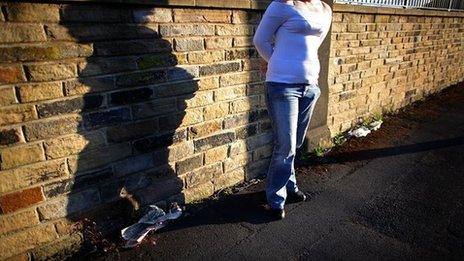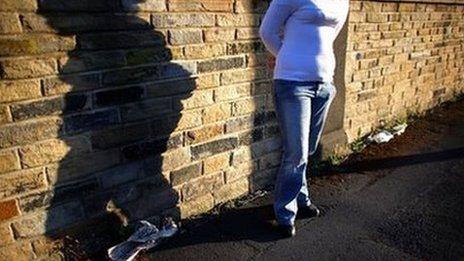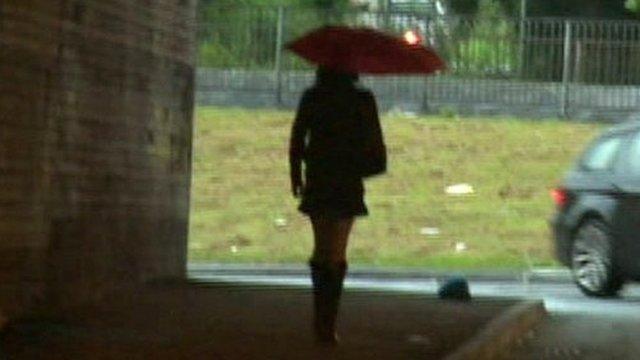Newport prostitutes plan must 'not turn city into Amsterdam'
- Published

The plans follow a similar pilot scheme in the north of England
A part of Newport which is being earmarked as a designated area for prostitutes should not become like Amsterdam, an MP has warned.
Gwent Police is considering plans to have a non-residential area of Pill for prostitutes.
A police spokeswoman said enforcement alone was "not an effective solution".
But Monmouth MP David Davies, who has debated prostitution on the Council of Europe, is cautious about the proposed move.
"I have some concerns about it. I wouldn't want parts of Newport being turned into the centre of Amsterdam," he told BBC Radio Wales.
"If it is about women who work as sex workers having availability to talk to health professionals or finding ways of getting them out of that lifestyle then I can see the arguments for it.
The plans follow a similar pilot scheme in the north of England
"If it's a case of 'let's just shove everybody out of the way and keep it out of sight' then obviously that's not a good thing.
"Those women who work on the streets are the most vulnerable to attack and women who work as sex workers are attacked a lot."

Cardiff sex worker 'Michelle' fears more attacks on sex workers

"Michelle", 48, has been working as a prostitute in Cardiff for the past two years.
She operates from her own home and said she would be "too frightened" to work on the streets.
Michelle fears designated areas could lead to more attacks on sex workers, including rape and murder.
She said: "Having a toleration zone is one thing; having them in the right area is another.
"There are wrong parts of every town and many girls who work the streets have horrendous tales to tell.
"It's like the police will put up with prostitution as long as it's kept out of the way of so-called decent people."
Michelle wants sex workers to be consulted and more safety for women working the streets, with proper policing.
She said: "The law is so intent in criminalising people. There are women in Cardiff who have been forced into the trade, trafficked. That needs to be stopped."
Michelle is part of the English Collective of Prostitutes, a network of sex workers.
A spokeswoman for the network said most sex workers were mothers working to feed their children and called for more resources to help women who want to leave the profession or stop using drugs.

'Good idea'
Alex Feis-Bryce, chief executive of National Ugly Mugs, a support service for sex workers when they are victims of crime, welcomed any move that did not involve enforcement.
"It's a good thing," he said.
"I think any approach by police that is a move away from enforcement is a good idea.
"One effect of having less criminalisation and less enforcement is sex workers are able to report to police when they're targeted, and they are frequently targeted in many areas by rapists, the most dangerous criminals."
He added: "Many sex workers want to move away from police. There's a certain lack of trust between sex workers and police.
"If this policy is being pursued it will have to be part of a bigger conversation with local support agencies, with sex workers themselves, with police, in order to ensure sex workers do want to work in the area that's been designated and they're willing to do so or the policy won't work."
The plans follow a similar pilot scheme in the north of England.
- Published26 July 2015

- Published27 March 2015

- Published19 September 2013

- Published29 August 2012
